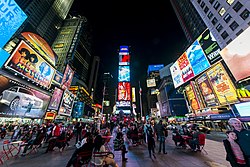Nightlife
This article needs additional citations for verification. (November 2013) |



Nightlife is a collective term for entertainment that is available and generally more popular from the late evening into the early hours of the morning.[1] It may include pubs, bars, nightclubs, parties, live music, concerts, cabarets, theatre, cinemas, and shows. These venues often require a cover charge for admission. Nightlife entertainment is often more adult-oriented than daytime entertainment. People who prefer to be active during the night-time are called night owls.[2]
Sociological research
Nightlife has been a vibrant area of research for sociologists. Nightlife establishments including pubs, bars, and nightclubs function as third places, according to Ray Oldenburg in The Great Good Place.[3]
Some sociologists have argued that vibrant city nightlife scenes contribute to the development of culture as well as political movements. David Grazian cites as examples the development of beat poetry, musical styles including bebop, urban blues and early rock, and the importance of nightlife for the development of the gay rights movement in the United States kicked off by the riots at the Stonewall Inn nightclub.[4]
There is debate about the degree to which nightlife contributes positively to social capital and the public goods of society. David Grazian points out that nightlife can "replicate the same structures of race, ethnic, and class inequality and exclusion found in the larger society."[4]
Grazian cites the use of dress codes by some nightlife establishments in the United States—mostly nightclubs—that specifically targets clothing popularised by hip hop culture represents a form of informal discrimination and segregation on racial grounds.[4]
Grazian also notes that nightclubs and club culture can create an environment that encourage or tolerate the "harassment and degradation of women," citing the expectation that both female workers and patrons of bars and nightclubs engage in highly sexualized performances of femininity including dressing in a particularly sexual manner in order to gain entrance to clubs.[4]
Regulation
Australia
Nightlife venues must be licensed to serve alcohol
United Kingdom
Nightlife venues must be licensed to serve alcohol under the Licensing Act 2003 (and the Licensing (Scotland) Act 2005 in Scotland). Venues with door security ("bouncers") are also required to ensure that the security staff are licensed by the Security Industry Authority.[5]
Since the introduction of the Licensing Act 2003, pubs and bars have been able to apply to operate until later. For nightclubs, this has become a form of competition as patrons can stay in the same pub or bar rather than move on to a club.[6]
United States
In the United States, legislation affecting nightlife was created after the 2006 murders of Imette St. Guillen and Jennifer Moore, after which American teenagers' use of fake IDs to obtain access to nightclubs was brought to attention.[7]
References
- ^ "Nightlife - Definition of nightlife by Merriam-Webster". merriam-webster.com.
- ^ Klein, Stefan (2008). Time. p. 20.
- ^ "Ray Oldenburg". Project for Public Spaces.
- ^ a b c d Grazian, David (2009). "Urban Nightlife, Social Capital, and the Public Life of Cities". Sociological Forum. 24 (4): 908–917. JSTOR 40542603.
- ^ "Licensing Act 2003". legislation.gov.uk. Retrieved 17 June 2015.
- ^ Moss, Stuart (2010). The Entertainment Industry: An Introduction. CABI. p. 66. ISBN 978-1-84593-551-1.
- ^ "Latest in St. Guillen investigation". Dateline. Archived from the original on March 22, 2007. Retrieved 2007-06-08.
{{cite web}}: Unknown parameter|deadurl=ignored (|url-status=suggested) (help)
